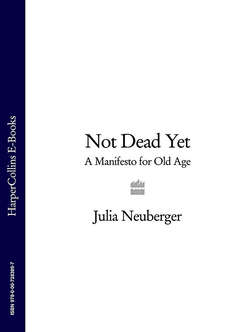Читать книгу Not Dead Yet: A Manifesto for Old Age - Julia Neuberger - Страница 30
Official efforts
ОглавлениеDespite a new official desire to keep people at work longer, and a plethora of initiatives to make sure that this happens, there are huge challenges in finding and keeping a job in later life, especially in areas of high unemployment, in the toughest regions or the toughest sectors. There is also real age discrimination. This is partly because of obsolete social protection schemes which means that older people get their earnings stopped to pay for their social support.
There is still a prevailing view that older workers are too costly and resistant to change. The Social Exclusion Unit of the Office of the Deputy Prime Minister reported in 2004 that the low level of older workers in jobs costs the economy between £19 and £31 billion a year in lost output and taxes, and increased welfare payments, not to mention all those skills lost to employers.9 Yet nine out of ten older people believe that employers discriminate against them, and a quarter speak from experience. As many as ten per cent of companies refuse to employ anyone over 50.
The European Union is now resolved to do something about this, given the waste of resource so many older people not working represents. The idea of anonymous CVs certainly helps people from ethnic minorities, another group who are unfairly discriminated against in employment, but they are very little help to older workers, because a glance at the work history gives away the rough age of the applicant.
Some EU member states have tried to create incentives for employers to hire specific age groups by making them more attractive – that is to say, less protected – than the rest of the workforce. But this approach has not really helped either, though those countries which have a rather different approach, and a range of positive active ageing policies, are succeeding in attracting older workers. It works where working conditions are improved for everybody, with early retirement schemes being restricted to cases where major restructuring is inevitable, and where allowing part-time work to be combined with part-time pensions is the norm, so that people are not caught in a social benefit trap where it simply is not worth their while to work.
The European Union is worried about their ageing populations and falling birth rates. Japan is facing similar issues, and tackling them by paying grants to employers of older people and by other means of supporting older workers directly. The Japan Organization for Employment of the Elderly and Persons with Disabilities (JEED) does a huge amount of work trying to get older people into work, and they also work to police the new law which forces employers to take measures to keep people in work until at least 65.
JEED provides counselling and advice services on employing older people, and the measures – half of the costs of which are paid for by the government – include health management counselling, specialist advice services for re-employment, and much else besides. This is so far in advance of anything done in Europe that it seems amazing to us, and yet these are exactly the kinds of measures we need to see if older people are to be comfortable at work and not treated as slightly eccentric for continuing to want to be there. They are also working away at a long-term ‘Project to Develop a Solid Foundation for a Society Where People Can Work Regardless of Their Age (The Age-free Project)’, to find out what kind of systems would be needed so that anybody can work regardless of age.
But beyond the subsidies to companies that are making efforts in this direction, there is support for self-employment too. If three or more older people (aged 45 plus) have united to start an enterprise, and are themselves employing workers, they can get grants to pay their start-up costs. All this is serious stuff, and worth close examination if the UK, and Europe more widely, are to be anywhere in the same league in employing older staff.
